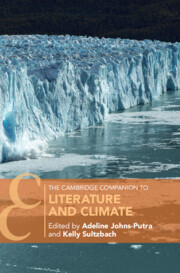Book contents
- The Cambridge Companion to Literature and Climate
- The Cambridge Companion to Literature and Climate
- Copyright page
- Contents
- Figures
- Notes on Contributors
- Introduction
- Part I Historical Shifts in Climate Consciousness
- Part II Current Issues in Climate Change Criticism
- Part III Ways of Telling Climate Stories
- Part IV Dialogic Perspectives on Emerging Questions
- Science Fiction and Future Fantasies
- Collective Climate Action
- Love Letters to the Planet
- Diverse Indigenous Voices on Climate
- 17 Climate Change and Indigenous Sovereignty in Pacific Islanders’ Writing
- 18 Literary Responses to Indigenous Climate Justice and the Canadian Settler-State
- Redefining ‘the Real’
- Selected Bibliography
- Index
- Cambridge Companions to …
17 - Climate Change and Indigenous Sovereignty in Pacific Islanders’ Writing
from Diverse Indigenous Voices on Climate
Published online by Cambridge University Press: 31 March 2022
- The Cambridge Companion to Literature and Climate
- The Cambridge Companion to Literature and Climate
- Copyright page
- Contents
- Figures
- Notes on Contributors
- Introduction
- Part I Historical Shifts in Climate Consciousness
- Part II Current Issues in Climate Change Criticism
- Part III Ways of Telling Climate Stories
- Part IV Dialogic Perspectives on Emerging Questions
- Science Fiction and Future Fantasies
- Collective Climate Action
- Love Letters to the Planet
- Diverse Indigenous Voices on Climate
- 17 Climate Change and Indigenous Sovereignty in Pacific Islanders’ Writing
- 18 Literary Responses to Indigenous Climate Justice and the Canadian Settler-State
- Redefining ‘the Real’
- Selected Bibliography
- Index
- Cambridge Companions to …
Summary
This chapter examines the relationship between climate stress, Indigenous sustainability, and sovereignty in the trans-Pacific context. Using the work of Keri Hulme (Maori), Craig Santos Perez (Chamorro Guam), Kathy Jetñil-Kijiner (Marshall Islands), Nequo Soqluman (Bunun Taiwan), Rimuy Aki (Atayal Taiwan) as counter-narratives, I challenge readers to reconsider the centrality of the Indigenous subject by retrieving overlooked trans-Pacific Indigenous experiences. Instead of ‘small islands in the remote sea’, as Epili Hau’ofa puts it, the Pacific/Oceania should be re-visioned as ‘a sea of islands’, giving rise to unique Indigenous ways of life expressed through outstanding cultural landscapes and seascapes in the intangible heritage of traditions, knowledge, and stories. The Pacific Islanders are united in their concerns of rising ocean levels, the connection between militarisation and colonialisation of the seas, and the ecological impacts of climate change on the ocean. I argue that narratives and poetry from Pacific Indigenous communities forge a constellation of resistant practices in the era of global climate crisis. Indigenous texts from the trans-Pacific propel us to reconsider human transformation of planetary networks in which Indigenous agency plays an important role. They formulate Anthropocene problems and reconceptualise connectivity between humans and other species, lands and waters, as possible solutions.
Keywords
- Type
- Chapter
- Information
- The Cambridge Companion to Literature and Climate , pp. 257 - 268Publisher: Cambridge University PressPrint publication year: 2022

